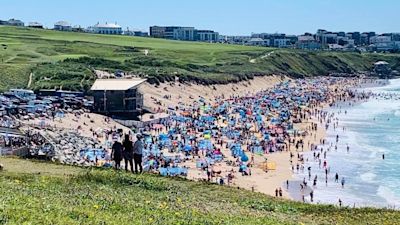RNLI issues safety warning after seeing spike in rip current rescues in Devon and Cornwall

With the summer holidays in full swing, the RNLI is warning families to take extra care when visiting beaches across the West Country.
The RNLI has reported a spike in incidents involving rip currents this summer.
Rip currents have been described as, 'currents that can quickly drag people into deep water a long way from the shore.'
On Thursday 30 July, there were almost 40 rip current rescues across Devon and Cornwall.
Last year, RNLI lifeguards dealt with more than 1,500 incidents involving rip currents, saving the lives of 95 people caught in them.
Steve Instance, RNLI Water Safety Lead for the South West said, "Our coastline is a fantastic place to spend time together as a family but there are also plenty of potential dangers, especially for those who aren’t fully aware of their surroundings.
"The main one is rip currents which cause most incidents in the water that RNLI lifeguards deal within the UK.
"We are seeing a spike in incidents this summer involving these potentially deadly currents, which move even faster than an Olympic swimmer and can quickly drag people into deep water a long way from the shore.
"They are difficult to spot and even the most experienced and strongest swimmers can find themselves caught out so it’s important where possible to use beaches that have lifeguards patrolling on them."
If you find yourself caught in a rip current, try to remember the following RNLI key safety advice:
Don’t try to swim against it, you will quickly get exhausted.
If you can stand, wade don’t swim.
If you can, swim parallel to the shore until free of the rip and then head for shore
If you can’t swim – FLOAT to live by leaning back in the water, extending your arms and legs, and resisting the urge to thrash around to gain control of your breathing
Always raise your hand and shout for help.
If you see anyone else in trouble alert the lifeguards or call 999 or 112 and ask for the coastguard.